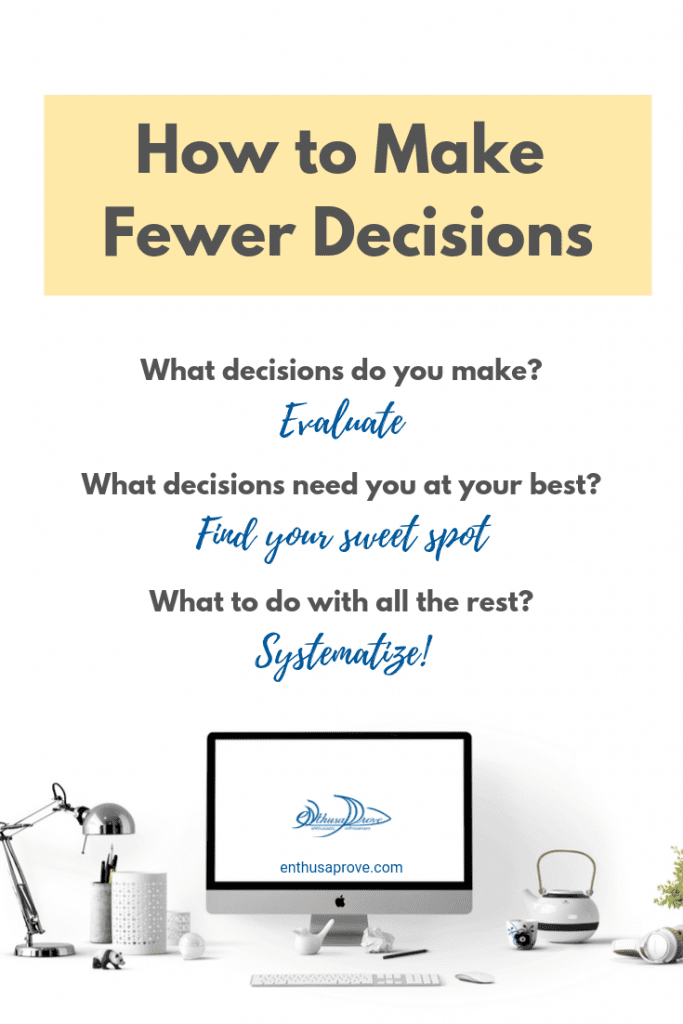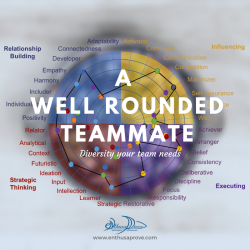
Systematizing to focus on what matters
Do you struggle with all the decision making in your day? Ever reached the end of the day completely incapable of making one more choice? Life as a project team leader involves an endless supply of decisions to make. Research says that the typical professional makes over 250 decisions every day. In your job leading a team, I’m sure that number is higher! That’s exhausting!
I have recently taken a look at my own load of decisions in my life and am trying to intentionally reduce the decisions I make. I like to squeeze as much out of life as I can, which means I’m often overloaded (completely self-inflicted!). I get so much joy in doing ALL the things, though I’m learning that the exhaustion isn’t worth it for myself, my business, or my family.
I’m determined to pare down the daily weekly, monthly decisions. That way I can do the big things in life. By SYSTEMATIZING as much as I can in life, when the decisions come along that need me at my best, I’ve got the energy and focus to take them on.
What about you? Do you snap at the end of the day because you can’t make one more decision? Do you run around crazy stressed because you’re trying to keep all the things in life moving? It doesn’t have to be that way! Let’s look into it together.
What decisions do you make?
Where’s my power cord? What to do with the next hour? What meetings do I have today? What to order for lunch? … These are all little things that take from your brain’s decision making capacity.
In your brain, you are constantly switching between receiving data and making decisions. This is the basis for the cognition portion of the MBTI preferences indicator. This interplay uses energy and focus to operate. Example: Your alarm clock rings in the morning, that is data. Then you make the decision to get up or hit the snooze button. There are hundreds or thousands of these mundane decisions that we make every day.
If we take a look at the people that have loads of decisions to make, e.g. Presidents, CEOs, Entrepreneurs, etc., we find a common thread. They come up with systems in life that simplify or eliminate the daily decisions. For example,
- Simplify Your Wardrobe Choices: Presidents and CEOs alike simplify the choices for what to wear, sometimes to extreme. Think Apple’s Steve Jobs’ black turtleneck, Former President Obama’s blue suit, or Pixar’s John Lasseter’s Hawaiian shirt selection. They don’t want to spend energy on what to wear and use up valuable energy. John Lasseter actually chooses his Hawaiian shirt based on his big goal for the day…just another way to stay focused.
- Have a Standard Business Lunch Order: Ever gone to a work meeting and been distracted from the business conversation because you couldn’t decide between the cobb salad and the French dip sandwich? Having a standard order of something you enjoy frees you up to engage with the business client. That discussion with this person is way more valuable!
- Systematize Your Home Life to Gain Focus at Work: The last decision you want to make when coming home is what to have for dinner. Then you wake up in the morning to no socks in your drawer. These things can throw you into panic and triage mode, which switches off your pre-frontal cortex (decision making) and sends you into your limbic system (fight/flight). Then you get to work spinning from the chaos and those important decisions that need your best don’t get it…because of your socks. Systems for managing home chores and menu planning seem unimportant but can significantly help your sanity. When you systematize chores you have a regular schedule that works with your life and keeps your sock drawer full.
- Keep Your Bag Packed: Ever ruined your morning searching for your keys, wallet, sunglasses, etc.? This uses valuable energy that sends you into a tizzy. Give these important items a spot at home that ensures that you are never caught without them. For example, I attach my car keys to my wallet so I can’t leave the house without my license, money, credit cards, insurance cards, and other vital information.
All these little decisions take away from the energy you have to take on your big dreams. Even though they are little and seem irrelevant to work, they don’t get you closer to your goals, don’t help your team, don’t develop your leadership ability… but they take energy that your big goals need!
What decisions need your best?
As a project team leader, you need to focus on where you provide your best value, your sweet spot. These are the things your team needs from you that no one else can do. What are the things that you can do that no one else on your team can do? Tasks that require the best of you, like your:
- Relationships and Position. Tasks that require you to make a pitch, air a grievance, smooth over relations, etc. These things need you because of your hierarchical position or more likely because of your relationships with others.
- Strengths. You are a rock star at ____________. Do you know what these things are for you? These are the areas where you have extraordinary ability to excel. When you use these gifts, you help the team in the most meaningful way you can, and experience joy in your work.
- Skills and Knowledge. Your education and experience background plays a part in what you are best suited to tackle for the team.
Have you looked into how your experience, talents, and passions combine to determine where you can be focused on goals that make the most difference? I’ve put together a course to help you do that, called Getting More Work Done by Using Your Strengths. It is a reflective journey that seeks peer feedback, personal reflection, and a professional indicator to see echoed themes throughout all aspects of your life, giving you insight into areas where you can contribute mightily. Check it out here!
What do you do with all the other stuff?
You have 3 options for all the things that don’t require you, the best of you. They are: Systematize, Outsource, and Eliminate.
- Systematizing takes the “who, what, where, how, when” out of repeated tasks. They still have to be done, but there’s less thinking involved. Anything that you want to make automatic in life is a candidate for systematizing. More on this below.
- Outsourcing is having someone else complete tasks for you. This is best when you don’t have the skill on your team or when the task is well defined and easily detached from other project work.
- Eliminating tasks is always the hardest for any team to do, especially if it is how things have been done before. Take a hard look at your goal. If that task is not contributing to it, nix it!
As project team leaders, you have to free up your decision making energy for things that mean the most to your project. There’s opportunity both at work and at home to help yourself be ready when that tough decision needs all that you can give.
Business Related Systematizing
Operations Playbook: These are standard processes that the team does regularly. This produces consistent results and an efficient team your customers enjoy. Put anything in this playbook that is a regular process for your organization.
- Customer order fulfillment.
- Touch points with the customer throughout working relationship. Where are the touch points where you can help your customer?
- Invoicing & Bill Payment
- Blogs
- Sales Follow Up
- Standard Responses to FAQs
- Scheduling Meetings
File Structures & Naming Conventions: When your team spends time looking for files, they burn up energy not directed toward getting the project done. Building a file system that organizes important documents, like your operations playbook, makes your processes repeatable and reduces churn on the team.
Team Meetings: Use a Trello board (Google doc, Evernote, Slack thread, etc) for each standing meeting. Have a card for each date, and teammates can add items as they come up throughout the week.
Email Responses: Do you write a similar email response over and over from scratch? (Guilty!) Try drafting the response and save it as an email signature. Then when that question comes in…bam! Response ready and done! There are email plugins for gmail if you need too, just look for “canned response.”
Life Systematizing
Whatever your family agreement for running your house, we are all affected by the systems in place (or lack thereof). The systems you use at home free you up to enjoy home life and be ready for what work will bring as well.
Meal Planning: In today’s economy, this can take lots of different forms.
- Menu Planning and Grocery Delivery (e.g. Hello Fresh, Blue Apron). This does it all for you, just pick the meal and make it.
- Grocery Delivery (e.g. Instacart)
- Meal Planning (e.g. eMeals)
- DIY: Chalkboard and Favorite Recipes.
Whatever method you choose for your family, the idea is to have a plan to save you from decision overload.
Chores: There are many systems for keeping up with home chores, and there’s the option to outsource as well. I’ve been working on my own system for managing my home life, which I learned from a book called “Sidetracked Home Executives”. The authors developed a simple card system to manage their homes and lives out of sheer desperation. I’ve made my own system from their ideas and experienced reduced stress about home chores and less instances of “Hey, I have no clothes…are you going to do laundry?”
Clothing: Maybe you take the executive’s route and simplify your wardrobe to a single category, or a few go-to pieces. There’s the option to outsource your clothes shopping too, with the plethora of subscription box services available. You could start with going through and getting rid of clothes that are the wrong size, worn out, outdated, etc.
Sweet, Sweet SYSTEMATIZED Freedom!!!
 Systematizing is a great tool to help you reduce the mundane decisions so that you can save your decision making energy for the things that need your best.
Systematizing is a great tool to help you reduce the mundane decisions so that you can save your decision making energy for the things that need your best.
We looked at:
- What decisions do you make? There’s lots of decisions to make all day long. Which ones do we really need to make?
- What decisions need you at your best? Find your sweet spot where you have extraordinary ability to excel.
- What to do with all the rest? Take an action to systematize something at work or home.
At eNthusaProve, we are committed to helping project team leaders enable joy in work. We believe that a team that experiences the true satisfaction of joy will accomplish great things. Part of creating an environment where we can enable joy is by taking out the decisions and emergencies that hold us back from achieving our goals.
As I mentioned at the beginning, I’m on this journey of systematizing my life so that I can focus on the things that matter most. I want my days to be purposeful and meaningful, because that is where I find joy. Do you want to come along too? Click below.





